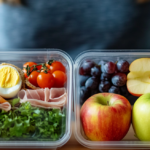Anoreksja u nastolatek – przyczyny, objawy i leczenie
Spis treści:
Co to takiego anoreksja?
Anoreksję inaczej nazywa się jadłowstrętem psychicznym lub brakiem łaknienia. Choroba ta polega na celowym, wręcz nałogowym unikaniu jedzenia, głodzeniu się, które ma prowadzić do jak największego spadku wagi. Najczęściej chorują dziewczęta, jednak nie oznacza to, że anoreksja nie dotyka również młodych chłopców.
Anoreksja jest jednym z wielu różnych diagnozowanych zaburzeń odżywiania. Obok bulimii stanowi jednak jedno z największych zagrożeń. Przyczyny występowania tak szerokiej skali zjawiska są zróżnicowane i dotyczą zarówno indywidualnych predyspozycji i sytuacji rodzinnej, jak i czynników kulturowych.
Ideał szczupłej sylwetki i społeczne oczekiwania atrakcyjności formułowane wobec kobiet promowane w mediach społecznościowych oraz szeroko pojmowanej kulturze wpływają bezpośrednio na to, w jaki sposób młodzi ludzi myślą o swoich ciałach. Zaczynają traktować je instrumentalnie. Ciało ma wyglądać, być atrakcyjne, a skala presji i wyśrubowane wymagania sprawiają, że nie sposób im sprostać. Głodzenie się i dążenie do jak najszczuplejszej sylwetki jest więc formą odpowiedzi na społeczne abstrakcyjne wymagania, poszukiwaniem akceptacji.
Innym czynnikiem, który sprzyja rozwojowi depresji, są problemy w środowisku rodzinnym. Konflikt z rodzicami w okresie, w którym dziecko buduje swoją autonomię, może sprzyjać rozwijaniu się zaburzeń odżywiania.
Anoreksja jest formą kontroli. Dziecko głodząc się, „wyszarpuje” ten kawałek swojego życia, który może być tylko jego, na który nikt inny nie będzie miał wpływu. Potrzeba odłączenia się od rodziców, samostanowienia, jest naturalną potrzebą nastolatków, dlatego ograniczający rodzice mogą przyczynić się do tego, że dziecko będzie szukało innych sposobów, by tę potrzebę zaspokoić. Nadopiekuńczość, uwikłanie, małą tolerancją konfliktów, sztywność zachowań oraz wyśrubowane normy, a także włączanie dziecka w konflikt między rodzicami to również okoliczności, które zwiększają ryzyko rozwinięcia się zaburzeń odżywiania u dziecka.
Do rozwoju anoreksji przyczyniają się także czynniki indywidualne, takie jak: zaburzony obraz siebie, lęk przed dojrzewaniem i dorosłością, duża potrzeba osiągnięć i zwrócenia na siebie uwagi oraz zyskania sympatii grupy rówieśniczej.
Objawy anoreksji u nastolatków
Anoreksja nie jest chorobą łatwą do wychwycenia, jeśli nie mamy dobrego kontaktu z dzieckiem. Zanim nastolatka zacznie poważnie chudnąć, może wykazywać jadłowstręt, czyli niechęć do jedzenia – odmawia wspólnych posiłków, je mało, je w samotności, nie ma apetytu, dobrze orientuje się wartościach kalorycznych różnych produktów, a jednocześnie dużo ćwiczy. Fizyczne zmiany to bladość, senność, brak energii, skóra i włosy w kiepskiej kondycji. Nastolatki z anoreksją nienawidzą swojego ciała, więc je ukrywają pod zbyt luźnymi ubraniami, jednak nie jest to reguła. Najczęściej jednak unikają konfrontacji ze swoim ciałem.
Anoreksja może objawiać się obrzydzeniem do jedzenia i sytuacji z nim związanych. Przy stole takie osoby nierzadko jedzą bardzo wolno, liczą każdy kęs i kroją jedzenie na bardzo małe kawałki.
Alarmujące powinny być omdlenia, bladość, arytmia, zahamowanie miesiączki, ciągłe odczuwanie zimna, zawroty głowy. Jeśli chodzi o psychologiczne objawy anoreksji, obserwuje się depresję, niepewność, egocentryzm, zmiany nastroju, dążenie do perfekcji, izolacja, niskie poczucie własnej wartości, odczuwanie nieszczęścia, kłamstwa i manipulacje. Te ostatnie wiążą się bezpośrednio z tym, że anoreksja jest chorobą, którą nie bez powodu stawiana jest na równi z uzależnieniem behawioralnym – rodzi się wstyd i niepohamowana potrzeba głodowania lub wymiotowania tego, co się zjadło (bulimia).
Diagnoza anoreksji
Jeśli rodzice otrzymują od otoczenia jakiekolwiek informacje, które mogą wskazywać na fakt, że dziecko choruje na anoreksję, powinni jak najszybciej skonsultować się z psychologiem dziecięcym, a przede wszystkim spróbować nawiązać kontakt z dzieckiem. Nawet jeśli dziecko ma objawy wskazujące na zaburzenia odżywiania, ale nie chudnie, powinniśmy zainteresować się stanem zdrowia dziecka.
Anoreksja I bulimia są to dwa różne zaburzenia odżywiania, bardzo często mylone. Bulimia różni się od anoreksji specyfiką – anoreksja polega na głodzeniu się, natomiast bulimia na kompulsywnym pochłanianiu dużych ilości jedzenia po to, by za chwilę je zwymiotować. Obie choroby są autodestrukcyjne, mają podłoże psychiczne, jednak w inny sposób wpływają na organizm.
Dokładną diagnozę zaburzeń odżywiania przeprowadza psychiatra, jednak wcześniej po pomoc można zgłosić się chociażby do lekarza rodzinnego, który zleci podstawowe badania, by ocenić czy objawy nie wynikają z innych, typowo somatycznych zaburzeń, np. chorób tarczycy, czy cukrzycy typu II.
Czy anoreksja jest groźna?
Zaniedbana, nieleczona czy nieodpowiednio leczona anoreksja może być chorobą śmiertelną. Osoba, która celowo się głodzi, podświadomie pragnie swej samozagłady. Chce zniknąć, nie chce żyć. To powolne, stopniowe samobójstwo, którego forma bywa wołaniem o pomoc.
Anoreksja prowadzi do wyniszczenia każdej sfery życia. Fizycznie to rozregulowanie pracy niemal każdego układu: zaburzenia rytmu serca, zaburzenia pracy nerek, osteoporoza, obecność acetonu w moczu, omdlenia, siniaki, zaburzenia snu, ciągłe osłabienie. Społecznie anoreksja prowadzi do przytłaczającej samotności i wykluczenia, zaś psychicznie anoreksja działa jak nałóg: oddala od zainteresowań, niszczy samoocenę, chory nie potrafi radzić sobie w konstruktywny sposób z emocjami. Poza tym odczuwa lęk, pustkę i bezsens życia, przez co z czasem pojawiają się myśli samobójcze i rozwija się depresja.

Polecamy
Depresja dotyka także najmłodszych. Nie bagatelizuj jej! "Próby samobójcze podejmują już nawet kilkuletnie dzieci", pisze lekarka
Twoje dziecko ostatnio na nic nie ma siły a może cały czas zgłasza bóle brzucha lub głowy? Depresja jest chorobą śmiertelną i nie omija najmłodszych. "Objawy często tłumaczone są 'buntem', 'dojrzewaniem' czy 'złym zachowaniem', pisze lekarka Aleksandra Pięta prowadząca profil na Instagramie @psychiatra_ola.
Jak radzić sobie z anoreksją?
Bezdyskusyjnie anoreksja wymaga leczenia specjalistycznego. Przede wszystkim pacjent pracuje z psychiatrą i psychoterapeutą. Nierzadko potrzebna jest pomoc innych specjalistów, by organizm dziecka mógł stanąć na nogi po wyniszczającej chorobie. Współpraca dietetyka również jest wskazana – do jedzenia wraca się powoli, tak, by nie zrazić pacjenta do jedzenia. Tak naprawdę w leczeniu anoreksji nie o chodzi o walkę z nią, lecz o oswajanie czynności jedzenia, oddzielanie go od emocji. Aby poradzić sobie z anoreksją, trzeba pracować całościowo, na wielu różnych płaszczyznach.
Czy konieczna jest pomoc specjalisty?
Jeśli obserwujemy u dziecka jakiekolwiek objawy, które mogłyby wskazywać na anoreksję lub bulimię, nie powinniśmy się wahać w kwestii kontaktu ze specjalistą. Nie każdy jadłowstręt to anoreksja, nie zawsze mdłości czy wymioty oznaczają bulimię, jednak zbagatelizowanie tych objawów może okazać się tragiczne w skutkach. Z tego powodu bardzo ważne jest, by do zdiagnozowania problemu podejść profesjonalnie i rzetelnie. Tym bardziej że znakomita większość nastolatek utożsamia atrakcyjny wygląd ze szczęściem osobistym i sukcesem.
Źródła:
- H. Sommer, Anoreksja nastolatek w świetle badań – droga do sukcesu czy akt powolnej autodestrukcji , Lubelski rocznik pedagogiczny, t. XXXV, z. 1 – 2016.








































